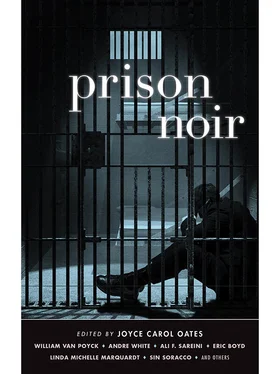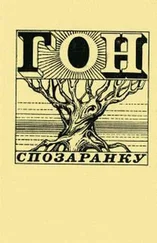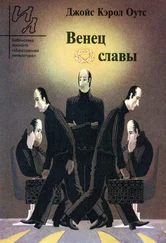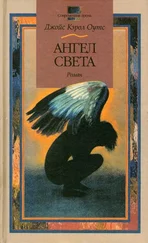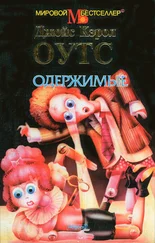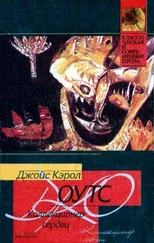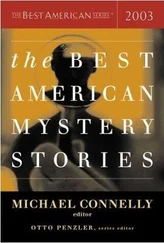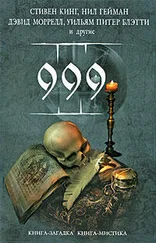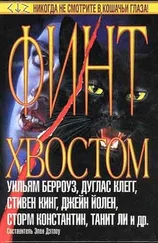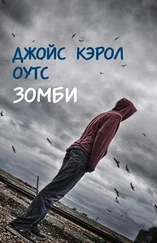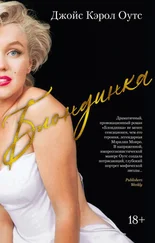Джойс Оутс - Prison Noir
Здесь есть возможность читать онлайн «Джойс Оутс - Prison Noir» весь текст электронной книги совершенно бесплатно (целиком полную версию без сокращений). В некоторых случаях можно слушать аудио, скачать через торрент в формате fb2 и присутствует краткое содержание. Год выпуска: 2014, Издательство: akashic books, Жанр: Крутой детектив, на английском языке. Описание произведения, (предисловие) а так же отзывы посетителей доступны на портале библиотеки ЛибКат.
- Название:Prison Noir
- Автор:
- Издательство:akashic books
- Жанр:
- Год:2014
- ISBN:нет данных
- Рейтинг книги:3 / 5. Голосов: 1
-
Избранное:Добавить в избранное
- Отзывы:
-
Ваша оценка:
- 60
- 1
- 2
- 3
- 4
- 5
Prison Noir: краткое содержание, описание и аннотация
Предлагаем к чтению аннотацию, описание, краткое содержание или предисловие (зависит от того, что написал сам автор книги «Prison Noir»). Если вы не нашли необходимую информацию о книге — напишите в комментариях, мы постараемся отыскать её.
Prison Noir — читать онлайн бесплатно полную книгу (весь текст) целиком
Ниже представлен текст книги, разбитый по страницам. Система сохранения места последней прочитанной страницы, позволяет с удобством читать онлайн бесплатно книгу «Prison Noir», без необходимости каждый раз заново искать на чём Вы остановились. Поставьте закладку, и сможете в любой момент перейти на страницу, на которой закончили чтение.
Интервал:
Закладка:
Prison Noir

Introduction by Joyce Carol Oates
PART I: GHOSTS IN THE MACHINE
Shuffle
CHRISTOPHER M. STEPHEN
Federal Correctional Institution, Oxford (Oxford, Wisconsin)
I Saw an Angel
SIN SORACCO
California Institution for Women (Corona, California)
Bardos
SCOTT GUTCHES
Fremont Correctional Facility (Cañon City, Colorado)
Trap
ERIC BOYD
Allegheny County Jail (Pittsburgh, Pennsylvania)
A Message in the Breath of Allah
ALI F. SAREINI
Coldwater Correctional Facility (Coldwater, Michigan)
PART II: CAGED BIRDS SING
Tune-Up
STEPHEN GEEZ
Ryan Correctional Facility (Detroit, Michigan)
Foxhole
B.M. DOLARMAN
Oklahoma State Penitentiary (McAlester, Oklahoma)
There Will Be Seeds for Next Year
ZEKE CALIGIURI
Minnesota Correctional Facility, Stillwater (Bayport, Minnesota)
Immigrant Song
MARCO VERDONI
Marquette Branch Prison (Marquette, Michigan)
Rat's Ass
KENNETH R. BRYDON
San Quentin State Prison (San Quentin, California)
PART III: I SAW THE WHOLE THING, IT WAS HORRIBLE
Milk and Tea
LINDA MICHELLE MARQUARDT
Women's Huron Valley Correctional Facility (Ypsilanti, Michigan)
Angel Eyes
ANDRE WHITE
Ionia Correctional Facility (Ionia, Michigan)
How eBay Nearly Killed Gary Bridgway
TIMOTHY PAULEY
Monroe Correctional Complex (Monroe, Washington)
3 Block from Hell
BRYAN K. PALMER
Jackson State Prison (Jackson, Michigan)
The Investigation
WILLIAM VAN POYCK
Florida State Prison (Raiford, Florida)
About the Contributors
Bonus Materials
"Run Kiss Daddy," by Joyce Carol Oates
from New Jersey Noir (Joyce Carol Oates, Ed.)
Sneak Peek: USA Noir
Also in Akashic Noir Series
Akashic Noir Series Awards & Recognition
About Akashic Books
Copyrights & Credits

INTRODUCTION
SEEDS FOR NEXT YEAR
"The blood jet is poetry”—these words of Sylvia Plath have reverberated through my experience of reading and rereading the fifteen stories of Prison Noir.
In this case the blood jet is prose, though sometimes poetic prose; if we go a little deeper, in some chilling instances, the blood jet is exactly that: blood.
For these stories are not “literary” exercises — though some are exceptionally well-written by any formalist standards, and artfully structured as narratives; with a single exception the stories are stark, somber, emotionally driven cris de coeur. (The exception is the collection’s only fully comic/satiric story, “How eBay Nearly Killed Gary Bridgway” by Timothy Pauley.) We may feel revulsion for some of the acts described in these stories, but we are likely to feel a startled, even stunned sympathy for the perpetrators. And in several stories, including even murderers’ confessions, we are likely to feel a profound and unsettling identification. As the protagonist of “The Investigation” says, at the end of the story that fittingly concludes this volume, “I saw the whole thing. It was horrible.”
These fifteen stories, highly diversified in language, setting, point of view, subject matter, and “voice,” have been chosen from a wealth of material — nearly one hundred story submissions — solicited by Akashic Books publisher/editor Johnny Temple, with whom I assembled the anthology New Jersey Noir several years ago. Over a period of months we encountered much writing that was extremely promising — distinctive voices demanding and deserving to be heard; virtually all of the submissions were serious and sustained efforts at writing fiction, and a number of the authors submitted multiple stories. Perhaps it shouldn’t be a surprise that so much well-crafted writing comes from the incarcerated when we consider that, hardly to our credit, the United States locks up nearly 25 percent of the world’s prison population, while having only 5 percent of the world’s overall population. Or, in other terms, the United States incarcerates more than 2.2 million individuals, a far higher rate per capita than any other nation. (According to the International Centre for Prison Studies, the US is number one, with St. Kitts and Nevis just below at two; Rwanda at six; South Africa at thirty-seven; Iran at thirty-nine; Israel at sixty-four; the UK at 104; China at 127; and Canada at 135.)
And why, we wondered, were so many good stories being written in Michigan prisons? It must be that prison writing programs are particularly strong in that state, but there are long-standing writing programs in New York, California, and elsewhere as well. So strange, we did not receive a single publishable story from any New York State facility. Undoubtedly, this is a reflection, in part, of the difficulty we had spreading our call for submissions far and wide to a population intentionally cut off from mainstream society. . We discovered along the way, for example, that some institutions don’t allow prisoners to write, while in others they are allowed to write but not, perversely, about crime or prisons!
It wasn’t always a “pleasure” to read this frequently raw, crude, and disturbing material, but it was definitely an engaging and illuminating experience; there are a number of stories here which I’ve reread several times, as if mesmerized, and one or two which I still don’t quite fully fathom, in the way that we are drawn to meditate upon highly subjective, introspective works of prose and poetry that don’t yield their meanings easily. Indeed, there is beautifully rendered prose in this volume — in “Bardos,” “Tune-Up,” “There Will Be Seeds for Next Year,” and “Angel Eyes,” among others — but writerly prose is probably not the primary reason one might be drawn to read stories by prison inmates. More likely it is the wish to see life from a perspective only imagined by most of us, and to speculate how, in the writers’ places, we might manage to survive, or fail to survive.
So suffused is prison fiction with seemingly autobiographical material, so steeped in the intensity of private anguish, it is tempting to describe most of it as “memoirist fiction”—at least, virtually all of the stories in this volume have the disconcerting ring of authenticity, and not invention. The author is compelled to write about him- or herself and to bear witness to what has been seen, heard, and experienced inside prison, no matter how painful, humiliating, or appalling. Not one of the stories I read evoked a fictitious world other than the claustrophobic prison-world, except in memory (and sometimes, as in the deceptively titled “Milk and Tea” by Linda Michelle Marquardt, the past is more nightmarish than the present); still less did any writer explore such popular genres as fantasy, mystery, or science fiction. Though the prisoners’ lives as recorded here often touch upon the surreal, the hallucinatory, and the frankly horrific, no one chose to write in the “horror” genre. How revealing this is, and how appropriate, the reader of Prison Noir will soon discover.
There is no need for fantasy-horror in a place in which matter-of-fact horror is the norm, and mental illness is epidemic. Vividly rendered realism is the predominant literary strategy, as in a riveting documentary film: “‘Meatloaf,’ grumbled Al. To him, it smelled as if someone had taken a dog and boiled it in its own offal” (from “Shuffle” by Christopher M. Stephen). “On days that they planned to kill [a condemned man], you could hear the men on H-South singing some kind of sound. . the most mournful sound my ears have ever heard” (from “Foxhole” by pseudonymous B.M. Dolarman). The tensely lyric “Tune-Up” by (also pseudonymous) Stephen Geez brings together prisoner-musicians in a touching and (to a degree) triumphant affirmation of the power of music to bind individuals together—“It’s play music or fight a lot,” as one of them says. The surreal, minimalist “Trap” by Eric Boyd moves in a quick, skidding jump to its stark conclusion: “I stared at my shirt, the word INMATE printed on the breast-pocket, thumping with the rapid beat of my heart.”
Читать дальшеИнтервал:
Закладка:
Похожие книги на «Prison Noir»
Представляем Вашему вниманию похожие книги на «Prison Noir» списком для выбора. Мы отобрали схожую по названию и смыслу литературу в надежде предоставить читателям больше вариантов отыскать новые, интересные, ещё непрочитанные произведения.
Обсуждение, отзывы о книге «Prison Noir» и просто собственные мнения читателей. Оставьте ваши комментарии, напишите, что Вы думаете о произведении, его смысле или главных героях. Укажите что конкретно понравилось, а что нет, и почему Вы так считаете.
